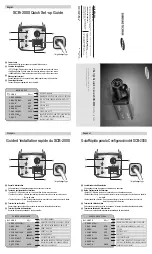
PRECAUTIONS
1. Do not attempt to disassemble the camera. To prevent
electric shock, do not remove screws or cover. There are
no user-serviceable parts inside. Refer servicing to
qualified service personnel.
2. Handle the camera with care. Do not abuse the camera.
Avoid striking or shaking it. Improper handling or storage
could damage the camera.
3. Do not expose the camera to rain or moisture, or try to
operate it in wet areas. Take immediate action should the
camera become wet. Turn power off and refer servicing
to qualified service personnel. Moisture can damage the
camera and also create the danger of electric shock.
4. Irrespective of whether the cameras are in use or not,
never face it towards the sun. Use caution when
operating the camera in the vicinity of spotlights or other
bright lights and light reflecting objects.
5. Do not operate the camera beyond its temperature,
humidity or power source ratings. Use the camera under
conditions where temperatures are within –5°C ~ +45°C
(23°F~113°F), and relative humidity is below 80% (non
condensing).
6. Do not touch the CCD sensor directly with your fingers. If
necessary, use soft cloth moistened with alcohol to wipe
off any dust.
7. Remove bubble internal packing foam before use.
2
INSTALLATION
2. Connecting the Cables
Please refer to the diagrams above.
1.
1
Power input cable.
2. The center pin of the power connector is +12Vdc and the
sheath is 0Vdc.
3. Connect the video cable to the dome at connector
2
.
ATTENTION
1. Check that power is off before handling the power cable.
2. Check 12vDC polarity before connecting to the PSU.
Wrong polarity will damage camera
.
3. Mounting the Camera Body
Remove the
bubble from the body and remove transit
packing foam. Align the housing to the holes you have
made, and use three screws to mount the camera body
to the ceiling or wall.
Choose screws suitable for the type of ceiling or wall
material, Screws with a diameter of 4 to 5 mm is
recommended.
3
ADJUSTMENT
1. Adjusting
the
Camera
Direction
Camera body moves in three ways: Pan, Tilt, and
Rotate. Adjust the direction so that the lens is
aiming at the target.
2. Fitting
Optional
Lenses
(EIA / NTSC only)
1. Carefully unscrew the attached lens assembly.
2. Taking care not to touch the optic of the lens or
the camera CCD, carefully screw the optional lens
assembly in place.
3. Take care not to cross-thread or over-tighten the
lens
3. Adjusting the View Angle and Focus
Turn the front of the lens assembly clockwise or
counterclockwise for optimum focus.
4. Completing the Adjustment and Installation
1. Carefully attach the dome cover.
2. Check connections are secure and that field of
view and focus are correct.
Packing List
1. Dome Camera with Fixed Lens:
x 1
2.
Instruction
Manual.
x
1
3. Drilling template.
x 1
4
1. Creating a Hole in the Ceiling or Wall
Use the supplied template to mark the
appropriate mounting position on the ceiling
or the wall.
Make three holes for the screws affixing the
camera body, and an additional hole for the
power cord and video cables.
For hard ceiling mount use the “knock-out”
on the base, on the opposite side to the
logo.




















